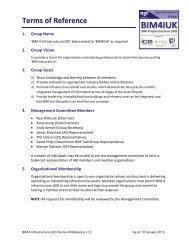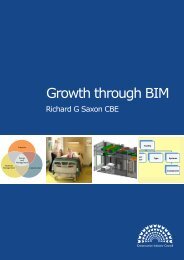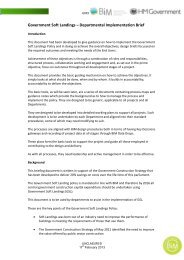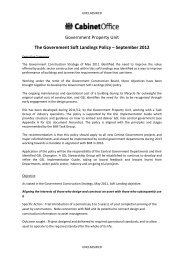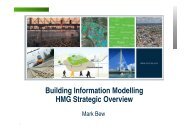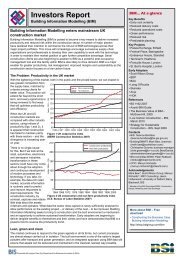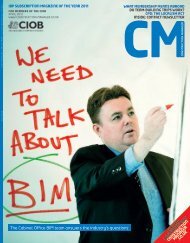BIM Task Group Newsletter 21st Edition
BIM Task Group Newsletter 21st Edition
BIM Task Group Newsletter 21st Edition
Create successful ePaper yourself
Turn your PDF publications into a flip-book with our unique Google optimized e-Paper software.
www.bimtaskgroup.org<br />
<strong>Newsletter</strong>, <strong>21st</strong> edition | Week ending 9th June 2013<br />
3 4 5<br />
Where you immediately converted to <strong>BIM</strong>.<br />
Actually, no. Some people ‘get it’ first time<br />
but when I first heard of <strong>BIM</strong> (If I recall correctly<br />
from a NESTA report) I was very sceptical<br />
and resistant. However, I have a passionate<br />
interest in (strategic) Lean construction<br />
and Design for Manufacturer and Assembly<br />
(DfMA) and I had a ‘Eureka’ moment on the<br />
connectivity of the ideas and I have not looked<br />
back. There is no shame in being a doubter -<br />
the only shame is false pride stopping a person<br />
from altering their view in light of emerging<br />
evidence. I think many people will start by<br />
being sceptical and, should I be any yardstick<br />
to go by, they will need time to rationalise <strong>BIM</strong><br />
to their own vision and model of good quality<br />
construction delivery (this period of adjustment<br />
is necessary and one reason why we provided<br />
a four-year lead-in to to the programme) the<br />
important thing then is to act decisively.<br />
How did BIS get involved with the <strong>BIM</strong><br />
programme?<br />
Looking back from what has been achieved to<br />
date and taking into account the fact it is only<br />
comparatively recently that <strong>BIM</strong> has become<br />
part of the lexicon for most people, it is difficult<br />
to believe that the idea of a <strong>BIM</strong> implementation<br />
strategy was hatched out over a conversation<br />
with Mark Bew and colleagues back<br />
2009. Then, as now, BIS encourages officials<br />
to follow their instincts on new ideas and I<br />
agreed with Mark to establish a working group<br />
to devise a strategy within 6 months to inform<br />
the Government Construction Board. Not<br />
knowing what the result would be, my boss<br />
here agreed to ‘carve-out’ a bit of time from<br />
the programme to allow the work to progress<br />
- in what, surely, must be counted as one of<br />
the pivotal decisions in UK <strong>BIM</strong>. This work<br />
turned into what is widely termed the ‘BIS<br />
<strong>BIM</strong> Strategy’ and then adopted by the Government’s<br />
Construction Strategy and the now<br />
familiar joint Cabinet Office/BIS programme.<br />
Why has the programme be successful?<br />
Firstly the people, The <strong>BIM</strong>-team are fantastic<br />
and a true exemplar of how the Civil<br />
Service and Industry can work together as a<br />
single team. I have the greatest respect for the<br />
talent, vision and leadership of Mark and Paul<br />
Morrell (who have done so much) and to the<br />
Construction Industry Council. But lets just<br />
give a bit of nod to the Civil Servants/public<br />
officials across government who quietly have<br />
‘done their bit’.<br />
Secondly it is a sound strategy, which requires<br />
clients to clearly set out their data requirements<br />
whilst leaving the industry to respond commercially<br />
(and in being non-proprietary in terms<br />
of <strong>BIM</strong> tools).<br />
Thirdly, over the last few years there has been<br />
a growing desire within industry (and the<br />
client base) to accelerate change away from<br />
the ‘old ways’ - <strong>BIM</strong> was in the right place at<br />
the right time. In this and many other ways<br />
I recognise we have had been fortunate - we<br />
grabbed the fortune given to us and used it to<br />
the advantage of the <strong>BIM</strong> project. The team’s<br />
motto was ‘keep going’ forward.<br />
6<br />
How is important do you think <strong>BIM</strong> is to the<br />
future of the UK construction sector?<br />
<strong>BIM</strong> (in it widest definition of tools, process<br />
and culture) is a big part of the change agenda<br />
for the industry (and their clients) but it has to<br />
be set within an overarching approach to construction<br />
which brings in other ideas - including<br />
‘lean’ thinking and improved procurement.<br />
It almost goes without saying that it has to be<br />
used ‘intelligently and knowledgably’. It also<br />
about clients and industry working as a team<br />
and I would like to say that there is no ‘I’ in<br />
<strong>BIM</strong> ...but alas.<br />
33





